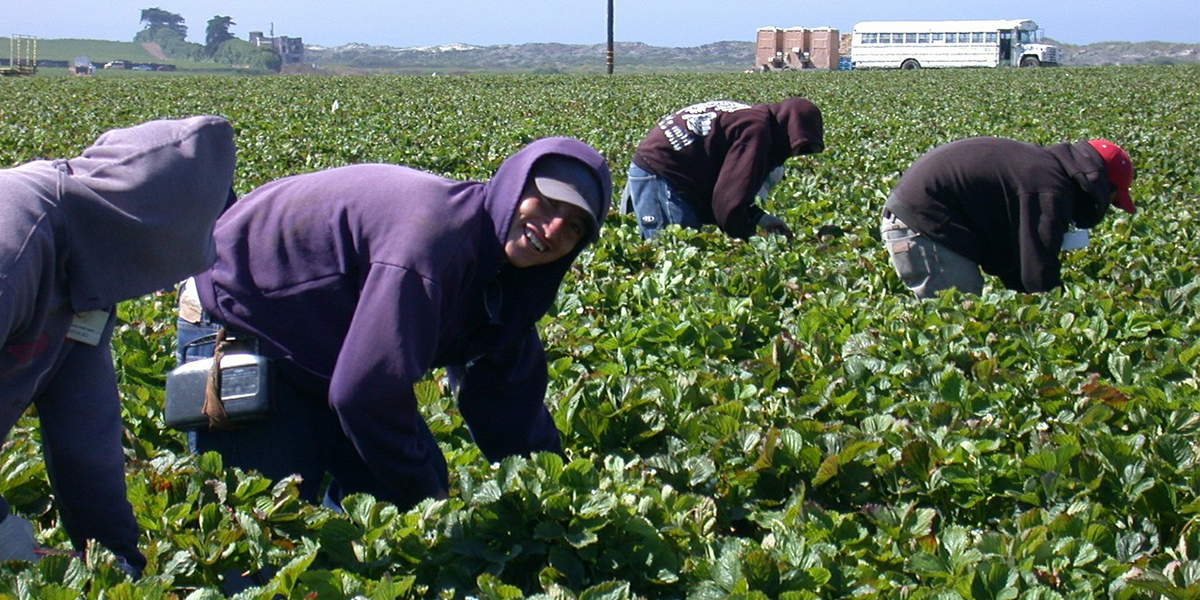
One thing that Americans have been able to consistently rely on during this pandemic is that grocery stores and supermarkets would have fresh fruits and vegetables on their shelves. We had milk, eggs, and grain. Toilet paper and hand sanitizer may have been hard to come by, but at least we had food.
What many people may not consider is that we would not have grocery stores full of broccoli, cheese, strawberries or bread if it weren’t for farmworkers. They are integral to the food supply in the United States. Whether you cook for yourself or grab takeout from your favorite neighborhood restaurant, you have farmworkers to thank.
Farmworkers and COVID-19
A lot of farmworkers come from immigrant and Latino communities, and their contributions to the health of our nation are impossible to quantify. And yet these workers face disproportionate risks of COVID-19 in part because of their working conditions: they may share transportation, share boarding rooms with others, and work side-by-side with their colleagues. If the United States prioritized these workers for vaccines, it would greatly reduce their risk.
Many policies and practices put farmworkers at greater risk
Farmworkers are essential workers, and the CDC recommends that they be in one of the first groups to be vaccinated, along with police officers and teachers. Unfortunately, some state and local governments are not following this recommendation.
Many states are vaccinating people who are not part of current CDC recommendations before making vaccines available to these essential workers. In at least one state, the governor stated that undocumented workers would not be eligible for the vaccine at all. While his office later amended the comments to refer to prioritization rather than eligibility, this still reflects policy positions that perpetuate health inequities for essential workers.
What needs to change
- Ensure legal access to vaccines
The Biden administration has committed to ensuring safe, effective, cost-free vaccines are available to the entire U.S. public regardless of their immigration status. States should follow this strategy and ensure vaccination of their entire population because it is the right thing to do both morally and for public health. - Bring vaccines to farmworkers
Local health departments should arrange to provide cost-free vaccines onsite with minimal paperwork requirements to reduce barriers and increase trust. - Reduce administrative barriers
Many farmworkers do not have IDs like driver’s licenses, or proof of residency like a utility bill. Some who do have IDs may have a different name on their ID than what they use with their employer. It can also be difficult for them to get a letter from their employer confirming their status as an essential worker. By requiring only the most essential personal information from workers, you can remove barriers and build trust. - Assure no penalty for missed work
Employers should assure that a worker who cannot return to work as a result of significant side effects will not lose their jobs or be punished in any way. This is not only the right moral and public health measure, but also beneficial economically. - Ensure access to the second vaccine dose
Health networks have successfully treated migrant workers for conditions like diabetes and tuberculosis. These networks connect workers who move to a new area to new health centers and community-based organizations. They can also make appointments and transfer medical records on their behalf, and arrange for mobile vaccination records. These same practices should be replicated to ensure migrant workers get their second dose of the COVID-19 vaccine. The CDC also allows for increased time between doses or using different brands of vaccine to accommodate special circumstances. - Build trust through partnerships
Partnerships between healthcare providers, industry organizations, community-based organizations and others is essential in protecting workers. Use our community engagement toolkit to get started. Some groups, like the Migrant Clinicians Network, specialize in working with migrants who travel across states.
Ensuring opportunities for COVID-19 vaccination among refugee, immigrant, and migrant communities is a moral and economic imperative. Learn more about how you can ensure an effective vaccine rollout for refugee, immigrant and migrant communities.